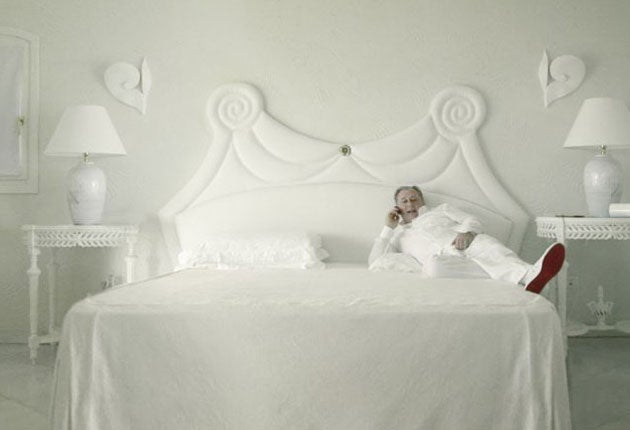First Night: Videocracy

Erik Gandini’s documentary about Berlusconi’s Italy arrives in Venice already trailing controversy in its wake. The film, whose trailer has been banned by the Italian state broadcaster RAI, portrays a country that has undergone its own bizarre cultural revolution – through TV.
The big shift started 30 years ago, when a TV quiz show started featuring housewives who would strip when contestants answered questions correctly. At the helm of the revolution was Silvio Berlusconi who realised – as Gandini puts it – that “the President of television is the President of the whole country”.
It’s hardly an original thesis but what makes Videocracy fascinating viewing is the inside view it provides of the celebrity-obsessed world that Berlusconi has created around him. Italy may be lagging badly when it comes to press freedom or gender equality but – Gandini argues – for pretty girls who want to appear on TV shows and marry footballers, the opportunities appear to be boundless.
Gandini, a Swedish-based filmmaker who grew up in Italy, somehow managed to gain access to Berlusconi’s inner circle. The subjects who talk frankly on camera include top talent agent Lele Mora, a friend of the President, and the supremely narcissistic Fabrizio Corona, who has made a fortune by selling (or suppressing) incriminating photographs of the many celebrities in Berlusconi’s Italy. Gandini tells us that Corona – who briefly spent time in prison for extortion – once even managed to sell some unflattering pictures of Berlusconi’s daughter to Berlusconi himself. (Ironically, the images were eventually published in one of Berlusconi’s own celebrity magazines.) We are taken to Sardinia, where Berlusconi spends his summers, and meet one of his neighbours. She is friendly with the Italian leader and runs her own business selling photographs she has taken of the starlets, moguls, politicians and celebrities who gather round the politician.
Alongside the images of Berlusconi in that infamous bandana and shots of ex-heavyweight champ Mike Tyson, she has a picture of Britain’s own Tony Blair, dressed in his holiday garb and smiling like a Cheshire cat.
Berlusconi himself is shown giving speeches or accepting awards. With his wraparound smile and utter conviction in his own genius, he is a serenely cheerful presence, especially when there are cameras around – although Gandini does reveal how prickly he is about photographs that don’t show him in the best light.
The filmmaker, whose last documentary Gitmo was about Guantanamo Bay, can’t quite make up his mind about which tone to adopt. At times, the film plays in comic fashion, albeit with a very sinister undertow. There are references to Al Pacino in Scarface. At times, with its voice-over, ominous music and stylised cinematography, it seems more like a noirish thriller.
Gandini contrasts the lives of the celebrities who lord it over their fellow Italians with those of a hapless young aspirant – a body builder and would-be singer who is desperate to enjoy some limelight of his own. There is something forlorn and pathetic about his quest for fame. In Berlusconi’s Italy, it is implied, the only way to earn respect is to appear on reality TV or gameshows.
Corona is the real star of the film. Shamelessly venal, he describes himself as a Robin Hood for the Berlusconi era. He steals (or at least elicits) money from the rich and gives it to... himself. Continually preening himself, he even allows Gandini to film him in the shower. Corona affects to despise the celebrities whose pictures bring him so much money but it’s evident he is desperate to become one himself.

Watch Apple TV+ free for 7 days
New subscribers only. £8.99/mo. after free trial. Plan auto-renews until cancelled

Watch Apple TV+ free for 7 days
New subscribers only. £8.99/mo. after free trial. Plan auto-renews until cancelled
Videocracy isn’t openly polemical but it’s easy enough to understand why Italian state TV thought the trailer for the film was “offensive” to Berlusconi’s reputation.
The documentary doesn’t explore the murky world of Berlusconi’s love life. There are no interviews with embittered lovers or salacious speculation about his marriage and sometimes turbulent relationship with his children. Instead, it focuses on the culture that Berlusconi has created around him. It is a culture of startling superficiality in which looking good on TV is the be-all and end-all.
Subscribe to Independent Premium to bookmark this article
Want to bookmark your favourite articles and stories to read or reference later? Start your Independent Premium subscription today.

Join our commenting forum
Join thought-provoking conversations, follow other Independent readers and see their replies